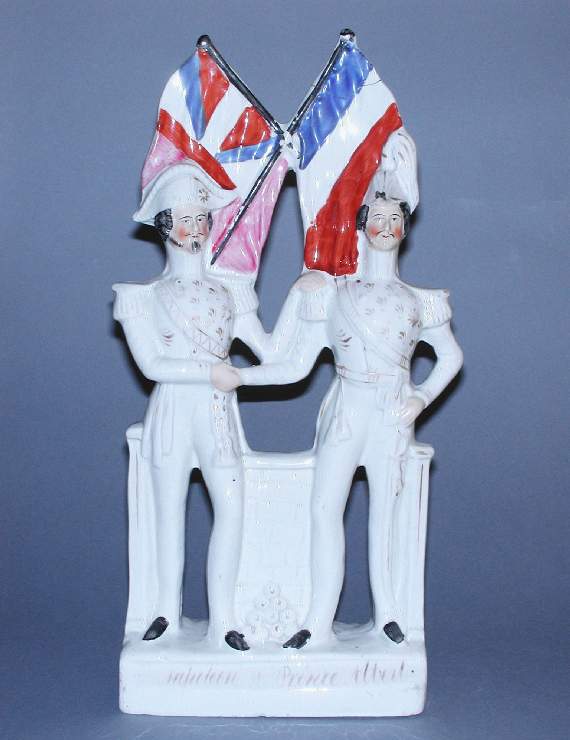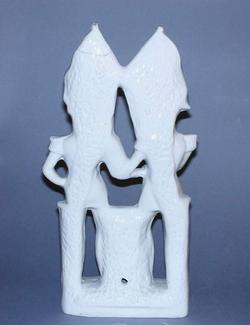Current Location: Gallery 27 (Glaisher)
Titles
Napoleon III and Prince Albert
Maker(s)
Production:
Unidentified factory
Entities
Categories
Description
White earthenware figure group moulded in three parts, with Albert's left arm and right forearm separately moulded, and pearlware glazed. Painted with black, blue, red, pink and flesh-pink enamels, and gilt.
Napoleon and Albert stand side by side, Albert' s right hand clasped in Napoleon' s left, and Napoleon's left hand resting on Albert's right shoulder. Between them is a low wall with a pile of shot at its base; on each side is a low pillar. Behind their heads are the crossed flags of France and Britain, the latter partially coloured in pink.The rectangular base has a chamfered edge to the front, on which 'Napoleon & Prince Albert' is painted in gilt script. The figure group is mainly white, with coloured flags and features picked out in enamels and gilt. Both figures wear military uniform and bicorne hats, which are decorated with touches of gilt; Albert carries a sword and his hat is plumed. Both figures have black shoes and wear finely painted moustaches and whiskers; Napoleon has a small beard. The underside is concave and glazed. The back is flat with rough marks in the clay and a vent hole 5cm from the bottom.
Notes
History note: Harrods’ Stores, antique department, London; bought on 20 May 1909 for 25 shillings by Dr Glaisher, Trinity College, Cambridge.
Legal notes
Dr J.W.L.Glaisher Bequest
Measurements and weight
Depth: 7.5 cm
Depth: 3 in
Height: 36 cm
Height: 14.25 in
Width: 19 cm
Width: 7.5 cm
Acquisition and important dates
Method of acquisition: Bequeathed
(1928)
by
Glaisher, J. W. L., Dr
Dating
19th Century, Mid
Victorian
Circa
1855
CE
-
Circa
1857
CE
Note
Louis-Napoleon Bonaparte (1808-1873), the nephew of Napoleon I, was elected President of France in 1848 and, after a coup d’état, ruled as Emperor Napoleon III from 1852 until 1870.
Prince Albert (1819-1861) was the husband of Queen Victoria. Born in Bavaria, he was the younger son of the Duke of Saxe-Coburg-Gotha. He was known for his interest in social reform and his active interest in the arts, science, trade and industry led to the 1851 Great Exhibition and the establishment of the South Kensington museums.
Rackham (1935) identifies this figure as of a type made chiefly by Sampson Smith, and Woolliscroft lists a similar figure (but with different base) as attributed to the factory. Sampson Smith is listed in contemporary directories as a ‘manufacturer of figures in great variety’ in Longton and seems to have begun making figures around 1851. But Sampson Smith figures were rarely marked, and although this group shares the gilt script title and mainly flat back of other figures identified as Sampson Smith, the modelling of the figures seems less ‘solid’ and the rectangular base and addition of subsidiary mouldings are untypical. There were many other, often smaller, manufacturers of figures working in Staffordshire at this time.
The alliance of France, England and Turkey against the Russia Empire in the Crimean War was a popular source for Staffordshire figures. This group appeared in a number of different editions , clearly made by several different Staffordshire potters. It may have been made to celebrate the state visit of Napoleon III to Britain, in April 1855, the reciprocal visit by Victoria and Albert to Paris, later that year, or the successful conclusion to the war in 1856. Given the Staffordshire potters’ penchant for celebrating those who championed social reform, it perhaps also sought to recognise Albert’s appointment as ‘prince consort’ in 1857.
School or Style
Victorian
People, subjects and objects depicted
Components of the work
Decoration
composed of
enamels
( black, blue, red, pink and flesh-pink)
gold
Materials used in production
White earthenware
Lead-glaze
Techniques used in production
Press moulding
: White earthenware moulded in three parts with Albert’s left arm and right forearm separately moulded, and pearlware glazed. Painted with black, blue, red, pink and flesh-pink enamels, and gilt. The underside is concave and glazed. The back is flat with rough marks in the clay and a vent hole 5cm from the bottom.
Painting
Lead-glazing
Gilding
Inscription or legends present
Inscription present: ‘Napoleon & Prince Albert’ is painted in gilt script
- Text: Napoleon & Prince Albert
- Location: Front of base
- Method of creation: Painted
- Type: Title
Inscription present: Rectangular paper label handwritten in black ink
- Text: No.3001. Staffordshire Group of Prince Albert and Napoleon III with English and French flags. Time of the Crimean War, 1854. b. in London May 20, 1909.
- Location: Underside of base
- Method of creation: Handwritten in black ink
- Type: Label
References and bibliographic entries
Identification numbers
Accession number: C.1026-1928
Primary reference Number: 71189
Old object number: 3001
Stable URI
Audit data
Created: Saturday 6 August 2011
Updated: Tuesday 30 April 2024
Last processed: Thursday 14 August 2025
Associated departments & institutions
Owner or interested party:
The Fitzwilliam Museum
Associated department:
Applied Arts





